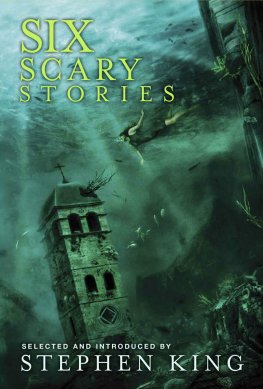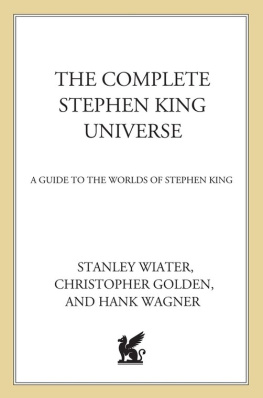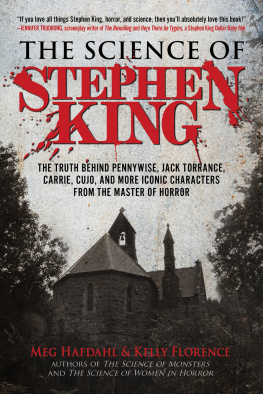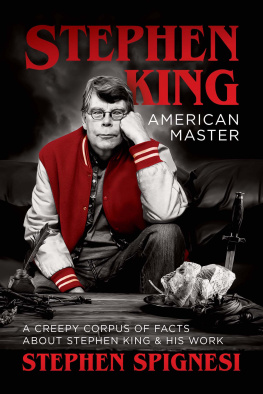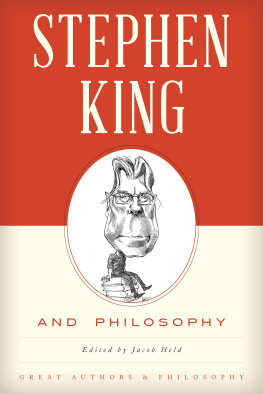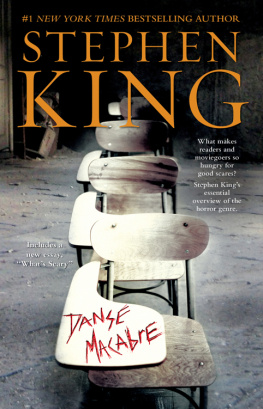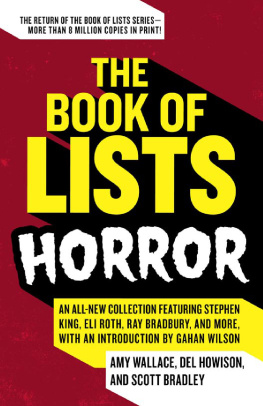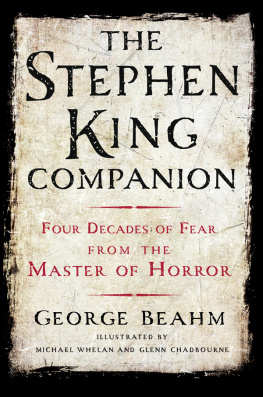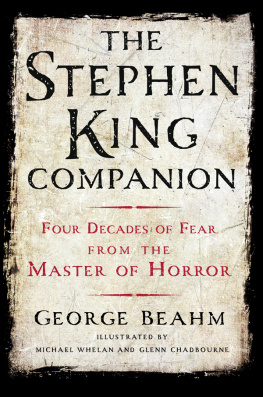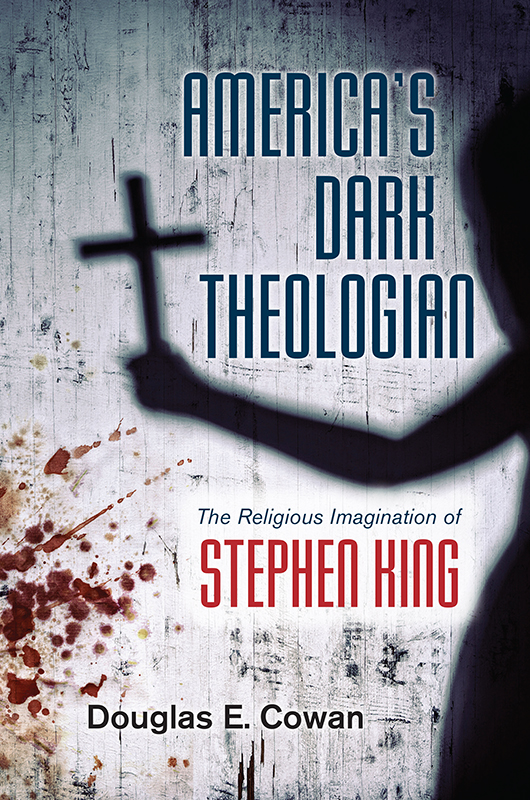
Americas Dark Theologian
Americas Dark Theologian
The Religious Imagination of Stephen King
Douglas E. Cowan

NEW YORK UNIVERSITY PRESS
New York
NEW YORK UNIVERSITY PRESS
New York
www.nyupress.org
2018 by New York University
All rights reserved
References to Internet websites (URLs) were accurate at the time of writing. Neither the author nor New York University Press is responsible for URLs that may have expired or changed since the manuscript was prepared.
Library of Congress Cataloging-in-Publication Data
Names: Cowan, Douglas E., author.
Title: Americas dark theologian : the religious imagination of Stephen King / Douglas E. Cowan.
Description: New York : NYU Press, 2018. | Includes bibliographical references and index.
Identifiers: LCCN 2017037991 | ISBN 9781479894734 (cl : alk. paper)
Subjects: LCSH: King, Stephen, 1947 Criticism and interpretation. | Religion in literature. | Theology in literature.
Classification: LCC PS3561.I483 Z6289 2018 | DDC 813/.54dc23
LC record available at https://lccn.loc.gov/2017037991
New York University Press books are printed on acid-free paper, and their binding materials are chosen for strength and durability. We strive to use environmentally responsible suppliers and materials to the greatest extent possible in publishing our books.
Manufactured in the United States of America
10 9 8 7 6 5 4 3 2 1
Also available as an ebook
This ones for Gary, who taught me that everythings grist for our mill.
Contents
Imagine youre in an airport boarding lounge, or the waiting room at virtually any train station or bus terminal in the Western world. Maybe you commute to work or school by subway. It doesnt matter. Look around. Somewhere in there, among hundreds of fellow travelers, lurks the shade of a tall, lanky man in a Red Sox gimme cap. Maybe they brought him with them, or bought him at a newsstand after swiping through the turnstile. Maybe they downloaded him, seemingly out of thin air, and hes hiding on an iPad or a Kobo. He may even be lying open in someones lap, real words on a real page. However he appears, though, chances are hes there. Somewhere.
Stephen King.
Americas dark theologian.
For more than four decades, in more than sixty novels, ten collections of short stories, and half a dozen nonfiction works, King has been one of popular cultures most constant and consistent literary companions. His books have sold hundreds of millions of copies and been translated into dozens of languages. Drawn in by his storyworlds, millions of fans avidly await each release, entranced in ways they might not even understand, yet eager to see what the acknowledged master of modern horror has to offer. Whenever a new Stephen King novel hit the shelves, the mother of a friend of mine always bought two copies: a first-edition hardcover for keeping, the spine never cracked, the dust jacket kept in mint condition, and a softcover reading copy, carried everywhere and read to tatters. Today, a signed first edition of any of Kings early works easily commands thousands of dollars on the used book market. A matched, signed, and uncut set of The Dark Tower novels can be yours on eBay for a little more than $30,000about what many people pay for their first new car.
Countless more people are familiar with Kings work as its been adapted for film and television, whether that means for the big screen by A-list directors (Stanley Kubricks The Shining or Brian De Palmas Carrie) or serialized for broadcast on B-list networks (TNTs Nightmares and Dreamscapes). Many of Kings novels and short stories have been filmed for the straight-to-DVD market, while others have seen worldwide release and won entertainment cultures highest awards. Maybe youve seen The Green Mile or Misery or Under the Dome. Maybe youve read a few of his novels or a collection or two of his short fiction. Maybe you think you know Stephen King.
Think again.
One afternoon, as King tells us in the authors notes to The Bazaar of Bad Dreams, his wife, novelist Tabitha King, sent him to the store for batteries and a non-stick frypan. Seems a simple enough task, but one that apparently also required a few other absolute necessities (cinnamon buns and potato chips). While weighing the merits of low-sodium ridged over kettle-cooked, King was approached by an elderly woman. She was a Florida snowbird archetype, he writes, about eighty, permed to perfection, and as darkly tanned as a cordovan shoe.
I know you, she said. Youre Stephen King. You write those scary stories. Thats all right, some people like them, but not me. I like uplifting stories, like that Shawshank Redemption. Looking down from his towering height, King told her, I wrote that too. We can only imagine the womans eyes narrowing ever so slightly as she replied, No, you didnt, and then continued down the aisle, primly ensconced in her motorized cart.
The elderly womans disbelief notwithstanding, the sheer range of Kings writing is almost without precedent. To get a sense of his work, go to any large bookstore and see how many different titles he has on the shelves. Browse the publication dates and youll realize that he has averaged more than a book a year, sometimes several in one year, since his breakout novel, Carrie, first appeared in 1974. Not only can few writers lay claim to such productive consistency, fewer still can do so while working in as many different subtypes of genre fiction. While he may be best known for his scary stories, The Eyes of the Dragon and The Dark Tower series, which King himself regards as his magnum opus, are solidly in the realm of epic fantasy. Joyland is a hard-boiled noir crime tale, while the Bill Hodges novelsMr. Mercedes, Finders Keepers, and End of Watchare more at home as murder mysteries.
Which is to say, he will be known for the fact that millions of people loved his books and found something meaningful in them.
As much as anything, these debates disclose the often petty and manufactured distinctions between genre fiction and serious literature, suggesting almost nonsensically that readers who embrace one cannot enjoy the other. By ignoring or rejecting writers such as Stephen King, critics reinforce these arbitrary notions of taste, of distinction, as the French sociologist Pierre Bourdieu put it, of highbrow versus lowbrow art.
For his part, King accepts the reality of being dismissed by the more intellectual critics as a hack, though he points out that the intellectuals definition of a hack seems to be an artist whose work is appreciated by too many people. yet profoundly disturbing us he presents. Reflected there in his dark mirror, we see shades of ourselves.
This book explores the storyworlds of Stephen King, and shows how his novels and short stories continually confront the answers we have been given about questions of ultimate meaning, questions we often think of as religious. It makes the case that, whether we are talking about sacred narrative or genre fiction, the stories we tell play an indispensable role in the ongoing human quest to understand our place in the universe.
No book on popular culture can, or should, be considered the complete guide to anything. Certainly not an anything as expansive and varied as the work of Stephen King. Rather, explorations of literature, film, art, and television succeed or fail precisely to the degree that they open audiences up to
Next page

